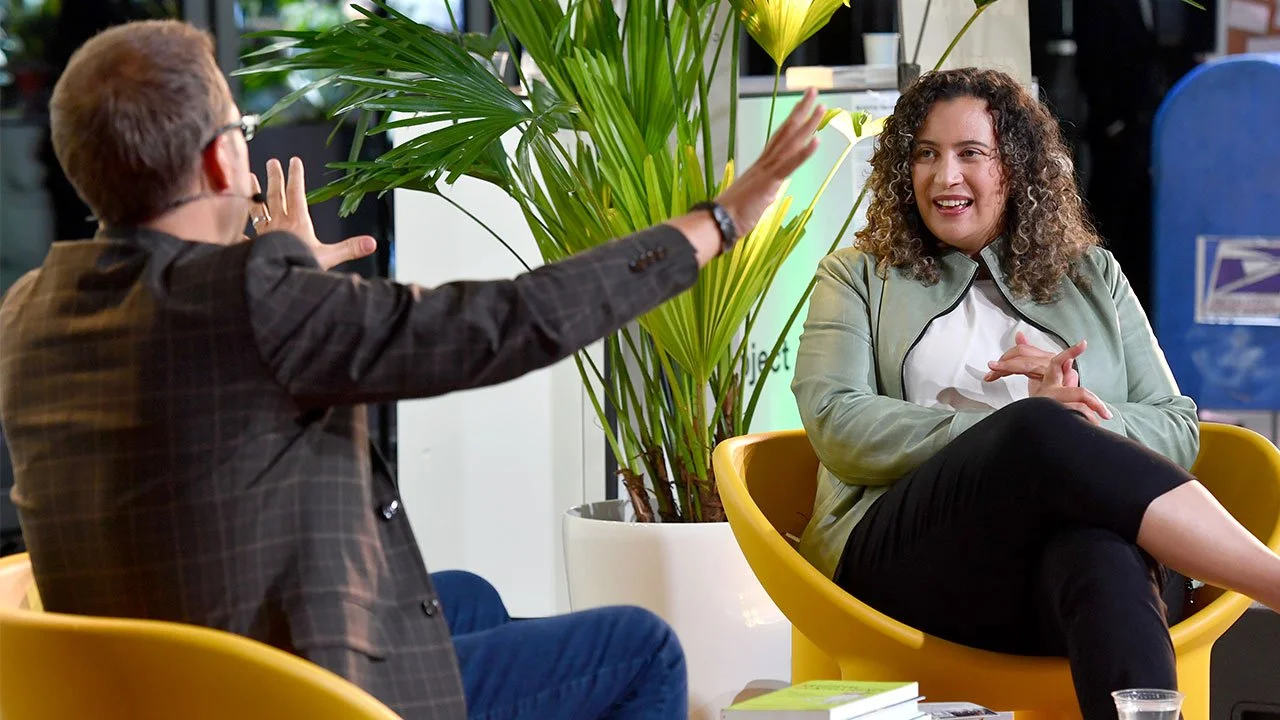All Tech Is Human Library Podcast Series #6 | Meredith Broussard
In the sixth conversation of a sixteen-part All Tech is Human Library Podcast interview series, Author, Data Journalist, and Associate Professor at New York University, Meredith Broussard, joins David Ryan Polgar for a conversation about the role of data journalism in constructing a better tech future. Check out the full podcast series here.
About Meredith Broussard
Data journalist Meredith Broussard is an Associate Professor at the Arthur L. Carter Journalism Institute of New York University, Research Director at the NYU Alliance for Public Interest Technology, and the Author of several books, including “Artificial Unintelligence: How Computers Misunderstand the World” and “More Than a Glitch: Confronting Race, Gender, and Ability Bias in Tech.” Her academic research focuses on artificial intelligence in investigative reporting and ethical AI, with a particular interest in using data analysis for social good. She appeared in the 2020 documentary Coded Bias, an official selection of the Sundance Film Festival that was nominated for an Emmy Award and an NAACP Image Award.
Broussard is an affiliate faculty member at the Moore Sloan Data Science Environment at the New York University Center for Data Science, a 2019 Reynolds Journalism Institute Fellow, and her work has been supported by New America, the Institute of Museum & Library Services, and the Tow Center at Columbia Journalism School. A former Features Editor at the Philadelphia Inquirer, she has also worked as a software developer at AT&T Bell Labs and the MIT Media Lab. Her features and essays have appeared in The Atlantic, The New York Times, Slate, and other outlets.
Key Takeaways
There is nuance in whether or not tech is the best tool to solve a problem, and it shouldn’t be in competition with non-tech solutions.
Democratizing algorithmic systems and AI looks like accountability and increased public awareness of how it works and its implications on our lives.
Data can be used to investigate and interrogate, in an interdisciplinary way, how systems operate to ensure justice.
Quotes
“So I was a black woman in my twenties working for big tech, working on Wall Street, working as a computer science researcher, and there was never anybody who looked like me ahead of me at the organization. And it was incredibly lonely. I didn't understand why I felt so isolated, why I didn't feel like I fit in, and then so I quit and I became a journalist… journalism has more women. And it is a friendlier place to be female. But then, after I had left, I discovered the research that looks at women in STEM careers. It turns out that all the reasons that I left my STEM career were textbook reasons that women writ large, leave STEM careers: the isolation, the being the only one, the having no mentors or people to look up to. So, I realized that it wasn't. That I, I had always felt like, ‘Oh, it's me. There's something wrong with me.’ And I realized, no, it's not, it's not me.” 2:12 - 3:20
“So data journalism is the practice of finding stories and numbers and using numbers to tell stories. And what I do as a data journalist is write code, often AI, in order to commit acts of investigative reporting. And I do a lot of reverse engineering of algorithms. So I'll look at an algorithmic system and say, ‘All right, how does this work?’ I'll figure out what are the inputs, what are the outputs, and then I can figure out what are the ways that the system is potentially discriminating.” 4:15 - 4:45
“One of the things that I often say is that techno-chauvinism has become our default, and it doesn't have to be, right? So sometimes the right tool for the task is technology and sometimes it's not, and it's not a competition. So like my smartphone, you will pry my smartphone out of my cold dead hands, like it is extremely useful and I don't know why anybody would, it would be silly to argue otherwise, right? But sometimes the right tool for the task is something simple like a book in the hands of a child sitting on its parents' lap. It's silly to say, ‘Oh, we don't need paper anymore because we have smartphones.’ That's just ridiculous.” 7:09 - 7:47
“...Algorithms are relatively new. The idea that algorithms are making lots of decisions on our behalf, people are still grappling with that, right? We're all at a different phase of our computational literacy journey, right? So like some people still have to be convinced that algorithms are actually making decisions and it's a problem. And then other people are already super paranoid about algorithms…So we're all at different points in our journey, and I think it's really important to educate people about the basics so that they can get involved in the conversation about algorithmic justice. Because you can't fight back against unfairness unless you actually understand what's going on.” 11:34 - 12:25
Learn More About Meredith Broussard
Website | Twitter
Credits:
David Ryan Polgar - Moderator
Meredith Broussard - Interviewee
Unfinished Live - Producers


